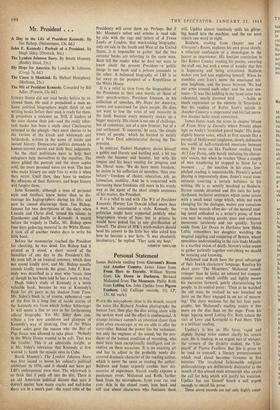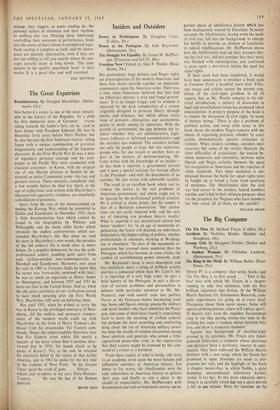Personal Statement
James Baldwin reading from Giovanni's Room and Another Country. James Jones from From Here to Eternity. William Styron from Lie Down in Darkness. Bernard Malamud from The Mourners. Philip Roth from Letting Go. John Updike from Pigeon Feathers. (All Calliope records, 331 LP, 13s. 6d. cach.)
PLACE the microphone close to his mouth, record the voice like Richard Avedon photographs the human face, then play the disc sitting alone with the spoken word and the effect is confessional. A strange intimacy compels an attention closer than print often encourages or we are able to offer the story-teller. Behind the power lies the technique, not only the engineer of the sound, but the pro- ducer of the human condition of recording, who must have been exceptionally intelligent and re- ceptive on these occasions. It is an exacting art and has to adjust to the probably newly dis- covered dramatic character of the reading author, which is never the same as reading the author. Baldwin and Jones urgently confide their dis- coveries of experience. Styron coolly exposes a passionate event. Malamud and Roth, farther back from the microphone, from your car and your skin in the closed room, lean back and tell you about characters who fascinate them
still. Updike almost tonelessly spills his glitter- ing hoard into the machine, and the ear soon rejects one word in eight.
Baldwin, reading from chapter one of Giovanni's Room, explores his own prose slowly, a reluctant confession or a monologue to the hearer as interviewer. His hesitant conviction is like Robert Creeley reading his poems, sweating the stuff out, but with a sense of wonder that this is happening and being articulated. Baldwin makes you feel him exploring himself. When he stumbles over Joey's name the emotional ten- sion heightens, and the pause between 'We had our arms around each other' and the next sen- tence—It was like holding in my hand some rare, exhausted, nearly doomed bird .'—holds as much experience as the silences in Stravinsky. But his reading of Rufus Scott's suicide in Another Country is impersonal and his fast narra- tive manner lacks vocal conviction.
James Jones reads the scene in chapter fifteen of From Here to Eternity where Prewitt plays taps on Andy's 'tarnished guard bugle.' His deep, slightly hoarse voice, which at first sounds like a parody of Hollywood toughness, slowly delineates his world of half-articulated emotions between men. He yarns on like Faulkner reading from As I Lay Dying, only barely imitating his charac- ters' voices, but when he reaches 'Once a couple of men wandering by stopped to listen for a moment . . .,' the emotion in his even, low- pitched reading is unmistakable. Prewitt's actual playing is impressively done, Jones's vocal com- mitment covering a certain heftiness in his writing. He is as acutely involved as Baldwin. Styron sounds detached and this suits his long- rhythmcd, inclusive sentences which come across with a small tonal range which, while not even changing for the dialogue, makes you conscious —as these records often do—of the natural read- ing speed embodied in a writer's prose, of how you may be reading accent, pace and sentence- movement carelessly and too quickly. Styron reads from Lie Down in Darkness.hdw Helen Loftis remembers her daughter watching the magical juggling and conjuring of Bennie, whose speechless understanding in the rain leads Maudie to a startled vision of death. Styron's voice seems to gather patiently together everything we should be noticing and knowing.
Malamud and Roth have the great advantage of their Jewish characters' language. Reading his short story 'The Mourners,' Malamud sounds younger than he looks, an amused but compas- sionate voice which swiftly and lightly moves his narrative forward, gently characterising his people, to its central point ; 'Then as he watched the old man, he realised he was bunched up there on the floor engaged in an act of mourn- ing.' The story weakens for the last four para- graphs, but Malamud's reading makes it live more on the disc than on the page. From his huge, lapsing novel Letting Go, Roth selects the visit of Levy and Korngold Co Paul Herz. This is a brilliant reading.
Updike's is less so. His fussy, rapid and slightly lisping voice cannot clarify his ornate style. He is reading, in an urgent sort of whisper,
the sermon of the divinity student, the 'Life- guard' of Pigeon Feathers. But this is prose to
be read to yourself, a literary pretentiousness which read aloud becomes tiresome. in five minutes. The involuted fashionable religious philosophisings are deliberately distasteful in the
mouth of this absurd male ectomorph who awaits the call for help which will justify his vocation. Updike has not himself heard a call urgent enough to uncoil his prose.
These seven records are not only highly enter- taining; they suggest, as poets reading do, the personal nature of sentences and their rhythms as nothing else can. Hearing these Americans controlling their sentences in performance, leads into the centre of their talents in unexpected ways. Each reading is complete in itself, and the sleeve- notes are decently informative, even if they are not too willing to tell you exactly where the pas- sages actually occur in long novels. 'The com- panion to the quality paperback book' is their motto. It is a good idea and well executed.
ERIC MOTTRAM







































 Previous page
Previous page